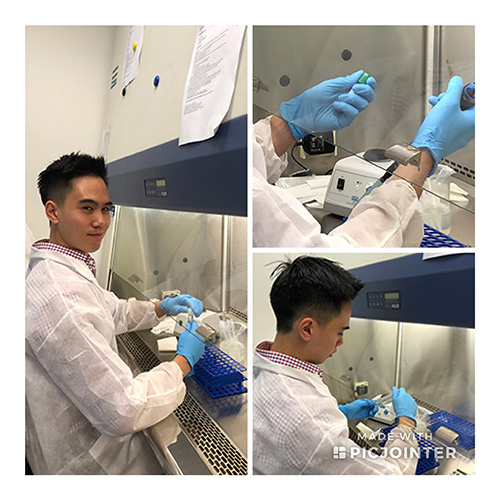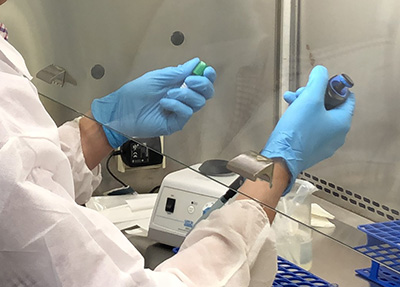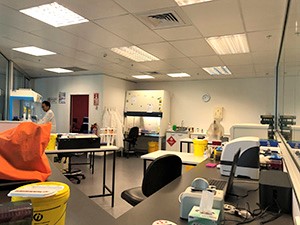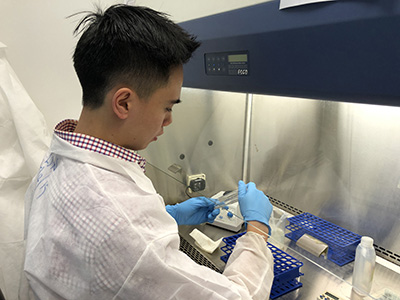What's it like having a career where … you’re helping people fight to prolong their lives

“When we find a result for terminally ill patients that links to a drug to improve their quality of life, the feeling is priceless,” says Lon Hua with a big smile.
No, Lon is not a front-line medical health specialist, but a medical laboratory scientist providing key test results - behind the scene - for people suffering with a terminal illness,.
“As a medical laboratory scientist – you can make a big impact in the medical and healthcare sector,” says Lon.
Medical laboratory scientist Lon Hua works at IGENZ, a clinical diagnostic laboratory, where he is involved in the diagnostic analysis of cancer patients’ DNA.
“Currently what I’m doing is called cancer genetic testing. We use state-of-the-art instruments to help us examine specific regions along the DNA. If we find something that is different, it may be linked with a possible treatment option.”
This means Lon spends a lot of his day looking at glass slides that have human specimens processed onto it that have been taken from people with cancer and other life-threatening diseases.
“On the other side of what may an ordinary glass slide is a person’s life, and that is something very important to keep in mind when you’re looking at the slide,” explains Lon.
He works in specialised spaces, such as a DNA extraction room or what he refers to as the “dark room” where FISH slides are analysed. The space is darkened because too much light impairs the use of the microscope.
“The most enjoyable part of this work is finding a clinically significant result that can be acted on immediately. That means a result that is linked with a treatment that will ultimately prolong an individual’s life or, at the very least, improve their quality of life for a little while,” explains Lon.
That is important stuff! As a medical laboratory scientist, Lon is part of the backroom support services that aid oncologists and surgeons in their diagnosis of a disease or in ruling out the possibility of other potential diseases.
“We are an essential component of the healthcare sector in the diagnosis and outlook of a patient suffering from cancer,” says Lon.
So how does it work?
Put simply, a patient’s sample is sent to the laboratory where it is registered, processed and analysed. Multiple checks are followed religiously to minimise the possibility of a mistake.
Specialist equipment scans over multiple regions along the DNA to look for changes… because there may be a drug that can be used to target the mutation responsible and combat the continuous growth of the cancer or tumour.
“If that is the case, the drug will potentially slow down the growth of the tumour and improve the quality of life for that patient, hopefully buying that patient more time to spend with loved ones,” says Lon.
The process requires a lot of vigilance, says Lon, to ensure nothing is missed.
 We’re dealing with a person’s life, so we want to make sure everything is done right the first time so we don’t release an incorrect result that could have devastating consequences.”
We’re dealing with a person’s life, so we want to make sure everything is done right the first time so we don’t release an incorrect result that could have devastating consequences.”
What is IGENZ?
IGENZ is a clinical diagnostic laboratory offering specialised testing, such as constitutional cytogenetic analysis, FISH test, analysis of haematological malignancies and molecular diagnostics. It is also the reference laboratory for breast cancers and offers paternity testing.
The Auckland based IGENZ laboratory has a staff of 13 that receives samples from the bottom of the South Island to the top of the North.
Lon finds many people are surprised that he is working on real patient samples as a medical laboratory scientist.
“Often people get the roles muddled up. I am not a phlebotomist, someone who draws blood from your arm.”
Lon’s journey into MLS
Lon became interested in Medical Laboratory Science at AUT because he wanted to work with science in a practical way. A curious person, he was keen to learn more about what went on behind the scenes. How many hands does a sample cross? How does that sample go from the body to a report?
Molecular genetics was a new third year specialisation he chose out of a curiosity about molecular diagnostics. It wasn’t exactly a booming field at the time in New Zealand, he says, but he felt it had a lot of potential.
“We’re now starting to see the molecular science field integrating into all disciplines, departments and hospitals, so I’m glad I made the decision to peruse genetics as a specialisation.”
His fourth-year internship with Liggins Institute expanded into a part time job over his final six months study at AUT.
“Internships are great because you get exposure to the lab environment and how they operate so it isn’t completely foreign to you later. Employers like that.”
After graduating in November 2015, Lon moved into a full-time research technician role at the Liggins Institute, where he gained his registration to practice as a Medical Laboratory Scientist. This requiresworking under supervision for 6 months in a diagnostics laboratory.He then got a job at IGENZ.
He loves working at IGENZ because it is a small team in a private medical laboratory offering lots of opportunity to take on varied tasks simultaneously.
“It’s a high learning curve. I’ve been able to build experience and expertise in one department and then transfer to another. That keeps me challenged and interested.”
Other workplaces for medical laboratory scientists include community and hospital diagnostic laboratories, research institutes and non-clinical industry laboratories.
 Tips to MLS students
Tips to MLS students
- When on placement, think about what you can do to make your supervising scientists’ life easier and offer to help as much as possible. Be enthusiastic and ask a lot of questions. That is important as it shows interest and passion.
- Someone who pays close attention to detail and adapts good laboratory habits will succeed in the lab.
- At the end of the day, the most important thing about being a medical laboratory scientist is that you demonstrate empathy and compassion and can put yourself into the shoes of the patient and the people that care about the patient. Remember the work you do has a direct impact on someone’s life.
Want to know more?
Read Future Careers in Medical Laboratory Science.
Contact the Employability & Careers team to discuss your career options.
2023 Update
Lon is now working as an Application Scientist at Ubiquitome
CVs/Cover letters
- 7 Tips on creating a great CV
- Personal Statement? Career Objective? What?
- Why bother with LinkedIn?
- Why bother to write a cover letter?
Job search skills
Career advice
- Bringing passion into the mix
- Don't let rejection end your dream
- Employability Skills - how to figure them out!